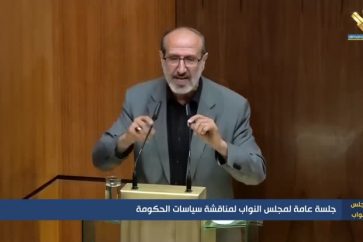Somaya Ali
Translated by Al-Manar English Website
“I hope the day will come when I can return Hajj Nabil’s favor,”
Former Hezbollah Secretary General Martyr Sayyed Hasan Nasrallah had always used to say about one of his compatriots.
Out of the 32 years of service as Secretary General of Hezbollah, Martyr Sayyed Hasan Nasrallah’s memories of the days spent shoulder to shoulder with the head of his personal security unit Martyr Ibrahim Jizzini, aka “Hajj Nabil”, would prove to have a unique place in his mind.
On 27 September, Hajj Nabil was martyred alongside his master, Sayyed Hasan Nasrallah, and from what little that can be said; his soul ascended in joy and reassurance. Joyful that his master appreciated his service, and reassured by the now alleviated fear that the rigid measures he surrounded the resistance leader with, would bother His Eminence. Hajj Nabil had been responsible for the task of overseeing Sayyed Nasrallah’s security since 1994, a heavy task entrusted to him by the one who gave him his nom du guerre “Nabil” – meaning in Arabic the noble man – senior Hezbollah commander and mentor Martyr Hajj Imad Mughniyeh.

Since that day, this stout burden etched a permanent place for itself in Hajj Nabil’s mind. Whenever he would return from a tough day on duty, he would almost always recount to one of his close friends (our source) how the Sayyed must be agitated with him somehow, only to be reminded that he had nothing but the highest appreciation for him. For Hajj Nabil, this constant guilt, this onus, would be a way for him to maintain his vigilance, such as when the difficult security circumstances that preceded the start of the last Israeli aggression on Lebanon required that the Sayyed be surrounded by claustrophobic security measures that forced the “noble man” to oppose His Eminence’s eager desire to be amongst his people, as he used to do whenever he could.
This begs the question: What truly brings these two men together? We saw in many images and videos that Hajj Nabil always shadowed Sayyed Nasrallah’s every footstep for many years, they were kneaded together, growing old and grey alongside one another. Countless trials and their thorny details passed between them both on their path, remaining exclusively in Hajj Nabil’s heart and mind, where the permanent and constant secrecy shaped most of his life. Martyr Hajj Nabil put a barrier between his work and his family that was absolutely unimpeachable, so much so that his wife and children never met the Secretary-General in person, according to one of his close associates who preferred anonymity.

So what really brought them together? Or to rephrase the question better; What kept them together for over three decades? Is it simply the relationship of a leader with his overseer? A simple confirmation is too obvious an answer. In the case of someone such as Sayyed Nasrallah, the transnational leader with a with a prestige comparable to Imam Ali Ibn Abi Talib (A.S.), a description that Hajj Nabil appreciated dearly, the relationship goes beyond this framework to something far greater and more sublime. And for someone like Hajj Nabil, he had passion and willingness to the Secretary-General “out of complete belief in the guardianship,” as the same source confirms.
The Guardianship
How did Hajj Nabil describe Sayyed Nasrallah? We ask, and the answer comes to remind us of that same unrelenting secrecy, “the permanent trait that shaped Hajj Nabil’s personality since the beginning of his vigil with late Hezbollah leader, which he worked to refine. Along with secrecy, Hajj Nabil worked on other skills pertaining to his craft, which was a meticulous eye for detail. At some point in his career, he was able to scan his surroundings with pinpoint accuracy in record time.”
This eye for detail supplemented his passion for Sayyed Nasrallah, which he himself always emphasized that it “stemmed from dissolving into the doctrine of guardianship, based on what the Secretary-General represents within the framework of this belief,” according to his close associate.
Hajj Nabil’s passion for Sayyed Nasrallah would always make itself apparent on his features, his close associate confirms to us.
“He would be sad and pained when he saw the families of the martyrs and pro- resistance crowds chanting for Sayyed Nasrallah, because he knew how deeply the Sayyed was affected when he heard these words. When Hajj Nabil came home happy, those close to him would guess that Sayyed Nasrallah must be happy as well. One day, he returned with a rose in his hand that the Sayyed had picked from a vase in front of him and offered it to him jokingly.”
So to answer the question we posed first, to Hajj Nabil, the Sayyed was not only his responsibility, but an unequivocal part of his very being.
Regardless of the efficiency of the process in building Hajj Nabil’s stern work ethic, three decades of such a heavy mission has its toll. “Hajj Nabil rarely slept deeply. Even when he did sleep, a mere shake of the bed would be enough to inflame his nerves, which was evident in in his hand trembling sometimes”.
He was always ready and present to perform his duty, and the longest hours were some of the Sayyed’s in-person appearances, years before he resorted to appearing exclusively via television screens. During these events, Hajj Nabil would not sleep for days on end,” according to his associate.
“Hajj Nabil always repeated that the Sayyed was anointed with the qualities of the family of Prophet Muhammad (peace be upon him and them all): firmness and great strength, accompanied with a gentle and compassionate demeanor. Hajj Nabil eyed Sayyed Nasrallah as always preoccupied with people’s concerns, their crises and whatever possible solutions for them were always present in his usual dialogue. He had a rare intelligence, one that made him capable of transforming an idea or a word into a refuted reading, criticism or question”.
Hajj Nabil once said that “His Eminence loves to recite the poem “Soothe Our Souls” about Lady Fatima (peace be upon her),” until Hajj Nabil and some of the young men in his retinue memorized it, and his face would beam with joy whenever they recited it to him.
“Soothe our souls, and sweep over our heads, O Zahraa, O Zahraa… O wing that fluttered within us, carrying the warmth of hope, its feathers a breeze of love and ephemeral speech.”
Translated from the 1995 poem “Soothe Our Souls” by Sheikh Bashar Al-Ali, recited by Hussein Al-Akraf on the nights of the martyrdom of Lady Zahraa (Pbuh) in Al-Zahraa Mosque, Hamad Town, Bahrain.
Should We Live After You?!
Despite Sayyed Nasrallah’s presence in most of Hajj Nabil’s life, the latter still yearned for him.” When? Perhaps, for example, when Hajj Nabil had to physically depart from His Eminence, while accompanying Martyr Hajj Qassem Soleimani, at the Sayyed’s direct request, throughout the late commander of IRGC’s Quds Force’s presence in Syria during the war against the Takfiri groups,” Hajj Nabil’s close associate added.
“Longing would appear in his features when contemplating any new picture of His Eminence, so he would sit and examine it carefully.”

As for Sayyed Nasrallah, he was always keen to check in on him whenever he was not around, calling on him whenever he was sick, and when he was injured during the war in Syria.
“Sayyed Hasan Nasrallah was Hajj Nabil’s entire life, he once confided in me that there would be no beauty or goodness in a world devoid of His Eminence, and his constant prayer was that he would not want to remain in a world without him,” Hajj Nabil’s associate told Al-Manar.
“And well… They departed together, and is there a greater and more beautiful gift for such a noble man?”
Source: Al-Manar English Website



